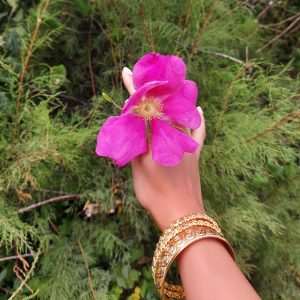Hair perfuming & Bakhoor
Blog › Hair › Hair perfuming & Bakhoor

What is Bakhoor?
Bakhoor is the name given to wood chips which are soaked in fragrant perfume oils and other natural ingredients such as flower oils and resins. These chips are then burned in special charcoal burners in order to release the deep and rich woody fragrant smoke.
Bakhoor in the Middle East
Bakhoor is the Arabic word for incense. Arabs have been using bakhoor for decades to scent their homes. Their love for fragrances, perfume oils, attars and Oud is not new. Arabic Bakhoor was traditionally burned on a piece of hot coal. When the fragrant piece of bakhoor (infused with attar oil, herbs, flowers, Oud and other woods) is placed on the hot coal it generates smoke that smells wonderful.
Very quickly Arab women discovered, that if they put their freshly washed hair above the bakhoor burner, the hair dries faster and absorbs and retains the scent from the smoke until the next wash.
Bakhoor is primarily used to perfume homes, clothing, and hair. It is a common practice to burn Bakhoor to infuse living spaces with a pleasant and long-lasting scent. The fragrant smoke created by burning Bakhoor can linger for hours or even days, providing a welcoming and aromatic atmosphere.
Bakhoor is not only a means of perfuming spaces but also a cultural and social practice deeply embedded in Middle Eastern traditions. It adds an element of luxury, hospitality, and spirituality to various aspects of life in the region.
Perfume in ancient India
If you were to travel to modern day Pakistan or Northern India and visit what locals call an “attar” or perfumery, you would be amazed by the variety of oil blends and fragrances you would find held in glass, air-tight jars. In the same area, around 4,000 years ago, the people of the Vedic Civilization were doing the same.
In ancient Indian literature from the the Vedic Age (between 1500 BC and 600BC), countless mentions of “fragranced smoke” were written, which referred to some type of bakhoor or incense that were used to perfume the surroundings. There are also mentions of people using fragranced smoke spiritually during religious ceremonies and even medically. Even today, incense is widely used across various places of worship in the East.
Some mentions even referred to bakhoor being used to treat emotional or psychological trouble- an early form of aromatherapy. Cosmetics were of social significance as well, as many men and women adorned themselves with plant-based perfumes and wore kohl that was fragranced and coloured their eyelids. Among the plants mentioned in Vedic scripts was Guggulu, a herb derived from a Myrrh tree local to India.
The term Guggulu in Sanskrit, a language spoken in the region, means ‘protects from disease’, the Vedic people believed it had many medical properties; they believed it soothed inflammation, cleared the sinuses, relieved skin disorders, and much more depending on the way it was used. Similar to modern day medicine, as menthol is used to clear the sinuses and blocked noses.
The Vedic people were an intellectual civilisation who were interested in how to truly enrich their lives, and focused on hygiene and decorating themselves. They sought to gain knowledge on how to live, not only a long life but a fulfilling and healthy life– both in mind and in the body. To them, self-care was not limited to food and shelter, but perfumes, cosmetics, and bakhoor to alleviate their moods and better their health.
Hair perfuming
Today, perfumes especially for hair are becoming more and more popular as the beauty industry continues to grow. Hair also seems to hold fragrance for longer than on the skin, making hair perfume and fragranced hair oils a new necessity. Hair rinses made with fragrant herbs and flowers were also used worldwide to not only perfume the hair, but also to add shine and improve hair health. Bakhoor however seems to have a much longer lasting fragrance that any of our modern day hair products and perfumes, and has potential health benefits. With such a rich cultural history surrounding it, the invention of Bakhoor really represents the innovation of ancient civilisations and cultural history which we often seem to forget.